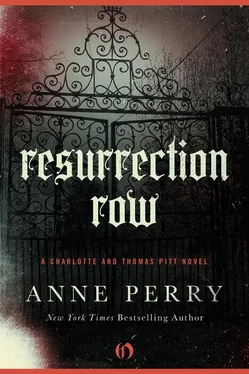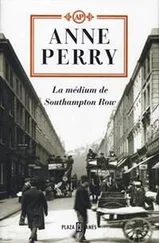Anne Perry - Resurrection Row
Здесь есть возможность читать онлайн «Anne Perry - Resurrection Row» весь текст электронной книги совершенно бесплатно (целиком полную версию без сокращений). В некоторых случаях можно слушать аудио, скачать через торрент в формате fb2 и присутствует краткое содержание. Жанр: Исторический детектив, на английском языке. Описание произведения, (предисловие) а так же отзывы посетителей доступны на портале библиотеки ЛибКат.
- Название:Resurrection Row
- Автор:
- Жанр:
- Год:неизвестен
- ISBN:нет данных
- Рейтинг книги:5 / 5. Голосов: 1
-
Избранное:Добавить в избранное
- Отзывы:
-
Ваша оценка:
- 100
- 1
- 2
- 3
- 4
- 5
Resurrection Row: краткое содержание, описание и аннотация
Предлагаем к чтению аннотацию, описание, краткое содержание или предисловие (зависит от того, что написал сам автор книги «Resurrection Row»). Если вы не нашли необходимую информацию о книге — напишите в комментариях, мы постараемся отыскать её.
Resurrection Row — читать онлайн бесплатно полную книгу (весь текст) целиком
Ниже представлен текст книги, разбитый по страницам. Система сохранения места последней прочитанной страницы, позволяет с удобством читать онлайн бесплатно книгу «Resurrection Row», без необходимости каждый раз заново искать на чём Вы остановились. Поставьте закладку, и сможете в любой момент перейти на страницу, на которой закончили чтение.
Интервал:
Закладка:
“There’s nothing ’ere, sir,” the constable said hopelessly. “Couldn’t rightly tell if there’s been a struggle in among this lot or not, seein’ as it’s such a mess, anyway. I suppose it’s bein’ a hartist, like?” He did not approve of art; it was not an occupation for a man. Men should do a job of work, and women should keep house, a neat and tidy house, if they were any good at it. “They all live like this?” He eyed the room with disdain.
“I’ve no idea,” Pitt replied. “See if you can find any blood. There was a hell of a bruise on his head. Whatever he hit it on is bound to have traces.” And he resumed his search of the desk, picking up a bundle of letters. He read through them quickly; they were of no interest that he could see, all to do with commissions for portraits, detailing poses desired, colors of gowns, dates for sittings that might be convenient.
Next, he came to a small notebook with a series of figures which could have been anything, and after each figure a tiny drawing, either an insect or a small reptile. There was a lizard, a fly, two kinds of beetle, a toad, a caterpillar, and several small hairy things with legs. All of them were repeated at least half a dozen times, except the toad, which appeared only twice and toward the end. Perhaps if Jones had lived, the toad would have continued?
“Found something?” The constable climbed over the urn and the chair and came across, his voice lifting hopefully.
“I don’t know,” Pitt answered. “It doesn’t look like much, but maybe if I understood it-”
The constable tried to lean over his shoulder, found it too high, and peered over his elbow instead.
“Well, I dunno,” he said after a minute. “Was ’e interested in them kind o’ things? Some gentlemen is-who don’t ’ave anythin’ better to do wiv their time. Though why anybody wants to know about spiders and flies is a mystery to me.”
“No.” Pitt shook his head, frowning. “They’re not naturalist drawings; they are all repeated at fairly regular intervals, and exactly the same. They are more like hieroglyphics, a sort of code.”
“What for?” The constable screwed up his face. “It ain’t a letter, or anything.”
“If I knew what for, I should know the next step,” Pitt said tartly. “These figures are set out in groups like either dates or money, or both.”
The constable lost interest. “Maybe that was ’is way of doin’ ’is accounts, to keep out nosy ’ousekeepers, or the like,” he suggested. “There’s nothing much over there, just a lot o’ things like you see in paintings, bits o’ plaster made up to look like stone, colored bits o’ cloth, things like that. Ain’t no blood. And they’re all in such a mess you can’t tell whether they been knocked like that, or ’e just threw ’em there, anyway. Seems like hartists is just naturally untidy. Looks as if ’e took photographs as well, as there’s one o’ them cameras over there.”
“A camera?” Pitt straightened up. “I haven’t seen any photographs, have you?”
“No, sir, now as you mention it, I ’aven’t. Do you think ’e sold them?”
“He would hardly sell all of them,” Pitt answered, puzzled. “And there weren’t any in the rest of the house. Now, I wonder where they are?”
“Maybe ’e never used it,” the constable suggested. “It’s in among all them things ’e put in ’is pictures; maybe that’s what it’s for, part of a picture.”
“Doesn’t seem the sort of thing you’d put in a picture.” Pitt climbed carefully over the chair and the urn and the pillars till he came to the black camera on its tripod. “And it’s far from new,” he observed. “So he hadn’t just bought it, unless he got it secondhand. But we can find out from his past clients if anyone had a portrait painted with a camera in it, or if anyone commissioned such a thing for the future.”
“It ain’t a pretty thing.” The constable caught his feet in a piece of the velvet cloth and swore vociferously. Then he noticed Pitt’s face. “Beg pardon, sir.” He coughed in a mixture of embarrassment and irritation. “But maybe ’e took photographs o’ people ’e was goin’ to paint, so ’e could know what they looked like when they wasn’t ’ere, like?”
“And then destroyed them, or gave them away afterwards?” Pitt considered it. “Possible, but I would have thought he’d want to see them in color. After all, an artist works in color. Still, it could be.” He started to examine the camera, pressing the pieces experimentally. He had never worked one himself, although he had seen them used by police photographers a few times and had begun to appreciate their possibilities. He knew the imprint of the picture was made on a plate, which then had to be developed. It took him a little fiddling before he got the plate out of this one, carefully, keeping it wound in the black cloth away from the light, because he was not used to it and did not know how fragile it might be.
“What’s that?” the constable asked dubiously.
“The plate,” Pitt replied.
“Anything on it?”
“I don’t know. Have to have it developed. Probably not, or he wouldn’t have left it in there, but we might be lucky.”
“Probably only some woman ’e was painting.” The constable dismissed it.
“He may have been murdered because of some woman he was painting,” Pitt pointed out.
The constable’s face lit up hopefully. “ ’Avin’ an affaire ? Well, now that’s a thought. Bit free with the posin’, you reckon?”
Pitt gave him a dry, humorous look.
“Go and get the servants one by one,” he ordered. “Starting with the butler.”
“Yes, sir.” The constable obeyed, but he was obviously turning over in his mind the limitless possibilities that had just dawned on him. He did not like effeminate men who made a great deal too much money by puddling around in smocks and painting pictures of people who ought to know better, but it was a good deal more interesting than the usual run-of-the-mill tragedies he saw. He did not want to be bothered with servants. He retired reluctantly.
The butler came in a few moments later, and Pitt invited him to sit down in the garden chair, while he himself sat in the one that had been beside the desk.
“Who was your master painting when he left?” he asked straightaway.
“No one, sir. He had just finished a portrait of Sir Albert Galsworth.”
That was a disappointment; not only someone Pitt had never heard of, but also a man.
“What about the picture on the floor?” he asked. “That’s a woman.”
The butler walked over and looked at it.
“I don’t know, sir. She appears to be a lady of quality by her clothes, but as you see, the face has not yet been filled in, so I cannot say who it may be.”
“Has no one been coming here for sittings?”
“No, sir, not that I am aware of. Perhaps she was due and had put it off until a more convenient time?”
“What about this one?” Pitt showed him the other, more nearly completed canvas.
“Oh, yes, sir. That is Mrs. Woodford. She did not care for the picture; she said it made her look lumpish. Mr. Jones never finished it.”
“Was there ill feeling?”
“Not on Mr. Jones’s part, sir. He is used to-certain persons’-vanity. An artist has to be.”
“He wasn’t prepared to alter it to suit the lady?”
“Apparently not, sir. I believe he had already made considerable adjustments to suit the lady’s view of herself. If he went too far, he would compromise his reputation.”
Pitt did not argue; it was academic now.
“Have you seen this before?” He pulled out the notebook and let it fall open.
The butler glanced at it, and his face went blank. “No, sir. Is it of importance?”
Читать дальшеИнтервал:
Закладка:
Похожие книги на «Resurrection Row»
Представляем Вашему вниманию похожие книги на «Resurrection Row» списком для выбора. Мы отобрали схожую по названию и смыслу литературу в надежде предоставить читателям больше вариантов отыскать новые, интересные, ещё непрочитанные произведения.
Обсуждение, отзывы о книге «Resurrection Row» и просто собственные мнения читателей. Оставьте ваши комментарии, напишите, что Вы думаете о произведении, его смысле или главных героях. Укажите что конкретно понравилось, а что нет, и почему Вы так считаете.












